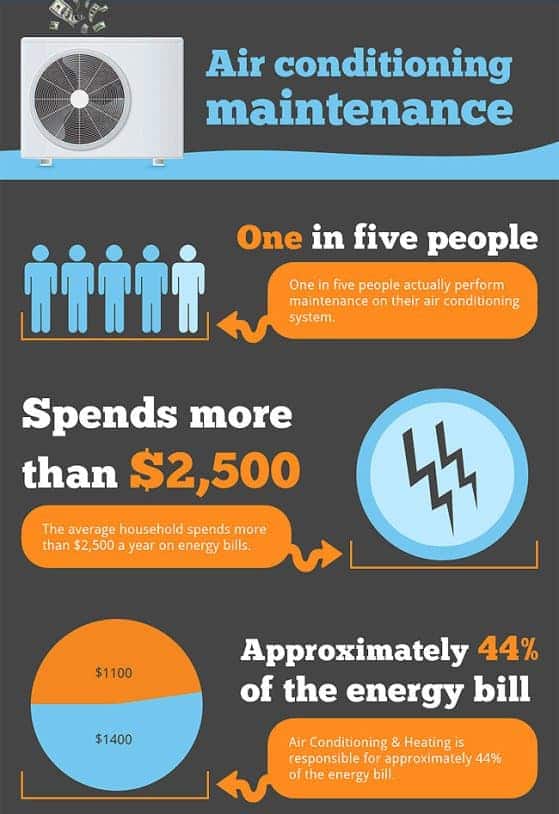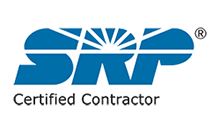Just like your car or gym membership, your air conditioning system needs periodic maintenance in order to continue functioning at maximum capacity. Luckily, much of this maintenance can be easily accomplished by any homeowner on their own.
Note, however, that certain maintenance items require professional HVAC technicians’ expertise; for example testing refrigerant levels and duct sealing.
Clean the Filters
Filters are essential in filtering the air flowing through your system from dust and other particles that would otherwise pollute it, while dirty filters can clog other parts and lead to malfunction. Therefore, it’s crucial that they be regularly maintained.
Cleaning your filter could be as straightforward as vacuuming and washing it, or replacing it. To begin this process, turn off your unit either at the thermostat or breaker box before finding where the filter resides; sometimes this could mean opening an air handler located in an attic, basement, or utility closet; other times it means simply flipping open latches that hold its grille open on an access panel filter access panel.
Your filter may be reusable; in which case, it must be rinsed and dried thoroughly before use again. If your filters are washable, keep their packaging to ensure that you purchase appropriate ones when purchasing new ones for your unit.
Once the filter has been thoroughly cleaned and replaced, turn your unit back on to ensure optimal efficiency. This should allow it to perform at its highest potential level.
Your unit’s evaporator coils and condenser coils come into direct contact with moisture and air, so they can become dirty easily. Regular cleaning should be conducted using a gentle setting on a hose nozzle to avoid accumulation. You should also take steps such as removing its cover, then using a mild cleaner or detergent with your hose on fan, grill and other areas as necessary; make sure you wear rubber gloves, face mask and ladder/stepping stool are at hand while cleaning away leaves or debris near it before beginning this task!

Cleaning the Condensate Drain in Mesa, Arizona
Drain lines are one of the most essential elements of an AC system, collecting condensation produced by evaporator coils and carrying it away from your home. If left unchecked, excess moisture in your drain line could accumulate and lead to mold or mildew issues as well as water damage and other problems with your AC unit. However, with just some bleach or vinegar and some time and patience you can quickly clear away this build-up in no time at all!
Before beginning to clean your air conditioning drain, first switch off its power by flipping the fuse lever associated with it. Next, locate the outdoor unit and follow its PVC pipe to your home – looking out for an access point near it with a cover as well as runoff location at its endpoint – plus dry rags to remove moisture from its drip pan.
Once you’ve found your drain line, open up its access port and add either vinegar or an equal mix of water and bleach in a cup to sit for 30-60 minutes before pouring it down the drain and closing up its access port – take extra caution not to spill any of this solution on metal parts as it could prove harmful.
Pouring one cup of this mixture down your drain line will kill any mold, mildew or bacteria that has formed within its pipes. After several weeks have passed, open your access port again and repeat this process to keep your drain clear.
Whenever your walls around an AC unit appear damp to the touch or discolored, this could be a telltale sign that its drain line has become blocked and is no longer expelling condensation from your system. Therefore it’s essential that during each cooling season you inspect this drain line regularly to prevent moisture backing up into walls and creating damp patches around your unit.
As part of your cleaning ritual, be sure to rake back any leaves or debris that has accumulated around the outdoor unit, cut back any trees or shrubs near it that might obstruct airflow, and ensure its optimal performance. This will ensure proper airflow is achieved.
Clean the Evaporator Coil
The evaporator coil of your air conditioning system cools or heats the air as it passes through it, usually inside your furnace or air handler in an attic. If your AC is no longer cooling effectively or air coming from vents smells musty, cleaning this part should be prioritized for regular maintenance to reduce mold growth that often contributes to musty air. Regular inspection can detect issues early and help keep mold growth at bay – something many fail to do!
Before beginning cleaning, turn off power to your air conditioner. To do so, either flipping the breaker switch in your breaker box, or finding the power switch near the air handler located inside your home – which resembles a light switch and often resides within a small grey box in an attic space.
Remove the access panel from your air handler using a screwdriver, using wet/dry vacuum to keep dust from scattering throughout your house as you work. After taking this step, look for a drain line coming from within the evaporator coil enclosure – typically an 1-inch PVC pipe of any color, though white, gray and black PVC pipes might work as well – that exits via either an evaporator pan drain, down an attic wall drain, or into the basement floor drain for attic units or basement floor drains.
Your evaporator coil should also be properly maintained. Any dirt or debris clogging up its coil can hinder airflow and decrease your system’s efficiency, leading to higher humidity in your home and more costly utility bills.
An effective way to clean coils is with a special coil brush, available from most hardware stores and AC shops. These brushes feature bristles that fall somewhere between hand broom and wire brush and are specifically designed to clean coils without harming their delicate structures.
Frost King ACF19 offers an effective no-rinse coil cleaner option. Simply spray this solution over all surfaces of the coils and allow it to sit for several minutes before rinsing off with a wet/dry vac.
Clean the Fan Blades
Dirty fan blades can hinder the performance of your system and even cause your AC unit to overheat and shut down altogether. Cleaning them is a quick and easy task that you can complete yourself or outsource the task to a professional service provider.
Before beginning to clean the unit, be sure to switch it off first and use a garden hose to flush away dirt, leaves, twigs and debris that has collected on its exterior. Rinse its coil and fan blades using two tablespoons of dish soap mixed into three cups of warm water using a clean cloth applied using warm or cool running water in either sink or tub.
Clean your air conditioning drain and hose regularly. As your AC draws the heat and moisture out of the air it blows into your house, some of it is channeled through small plastic pipes into its drainage system or hose for proper disposal – this should be regularly cleared of clogs to ensure condensation does not build up and flood your home with excess water.
. If your air conditioner features removable grates, simply unclip and remove them before cleaning them along with fan blades with all-purpose cleaner or mild detergent solution. A can of compressed air or handheld hair dryer equipped with a blower attachment may be helpful to quickly blast away light accumulations of dust from front fan blades.
Maintain your AC unit by periodically checking its fins for bent or twisted areas, using a butter knife or similar kitchen utensil to gently straighten them out if you find any that are bent or twisted. When you find any bent fins, straighten them gently using butter knives or similar tools; exert too much pressure, however, or you could damage their delicate fins and risk serious problems in the future and reduce lifespan significantly. Performing these maintenance tasks on an ongoing basis is the key to keeping it running efficiently for many years – however even when performing these maintenance tasks alone it would benefit from having it examined annually by an AC technician just in case any serious problems occur before becoming severe issues arise and before becoming catastrophic.











